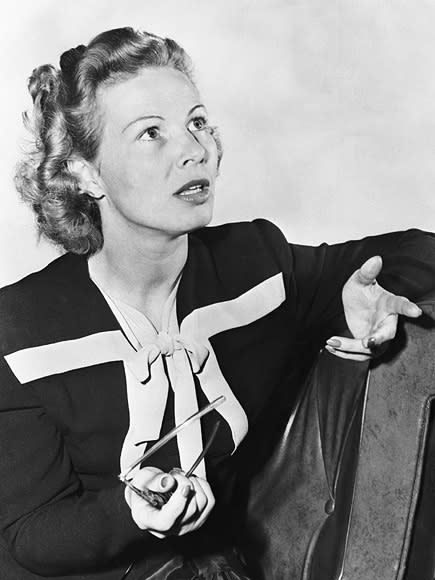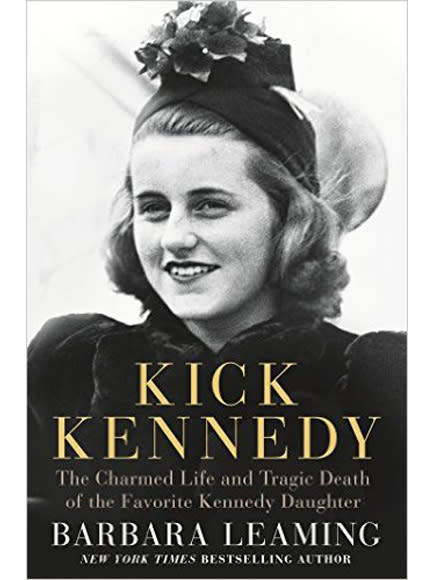Inside JFK's Forbidden Romance with Former Beauty Queen – and Suspected Nazi Spy – Inga Arvad
On Nov. 27, 1941, noted Washington Times Herald writer Inga Arvad introduced a 24-year-old John F. Kennedy to readers as "a boy with a future."
By the time those words hit the press, the future president and Arvad, a Danish former beauty queen then living apart from her second husband, were locked in a passionate love affair.
Their secret romance is detailed in Barbara Leaming's new biography, Kick Kennedy, about Kennedy's sister Kathleen, who died in a plane crash at 28.
Arvad, a beauty-queen-and-film-star-turned-journalist, was introduced to Kennedy by Kick, her friend and colleague at the Times Herald. Like many women before and after her, Arvad instantly fell under Kennedy's spell.

"He had the charm that makes the birds come out of their trees," she later wrote of her first meeting with Kennedy, who was serving as an ensign in the U.S. Navy at the time. "He looked liked [Kick's] twin, the same mop of hair, the same blue eyes, natural, engaging, ambitious, warm and when he walked into a room you knew he was there, not pushing, not domineering, but exuding animal magnetism."
To put it more succinctly, "I have gooey eyes for him," she confided to another friend at the Times Herald.
Arvad, who at 28 was four years Kennedy's senior, quickly took him under her wing, reading and critiquing his writing, discussing politics and history with him, and offering shrewd advice on his potential political career. All the while, Arvad was also giving Kennedy an education on sex.
"With a nod to the European tradition of the older female who undertakes to educate a young lover, Inga declared that Jack … still had a lot to learn and that she was pleased to be the one to teach him," Leaming writes.

Arvad and Kennedy enlisted Kick and her then-boyfriend John White to help them carry out their affair in secret. Arvad's Hungarian-born husband, Paul Fejos, was living in New York at the time and was known to be "explosively jealous."
At first, everything went according to plan. Kick and White would regularly appear with Arvad and Kennedy at the start of an evening, and then discreetly leave the two lovers alone for a while, before rejoining them at the end of the night. To all the world, they appeared to be a group of four friends out for a lively evening.
The beginning of the end of their affair involved a most unlikely player – Adolf Hitler. As a young freelance reporter in Copenhagen, Arvad once traveled to prewar Germany, where she landed an interview with Hitler. Pronouncing the stunning blonde a perfect specimen of "Nordic beauty," the ruler invited Arvad to be his guest at the 1936 Olympics, where they were photographed together in his private box.
When the U.S. entered World War II in December 1941 – one month after Arvad published her column singing Kennedy's praises – Arvad's connection to Hitler came back to haunt her. Suspecting she was a Nazi spy, the FBI launched an investigation into Arvad. Federal agents tapped her phone and watched the front door of her home, where they frequently saw a "tousle-haired young man" they knew "only as Jack," the Leaming writes.
When Kennedy's identity was finally revealed, his father, former U.S. ambassador to the U.K. Joe Kennedy – who had initially approved of his son's relationship with a worldly older woman – wanted Arvad out of Kennedy's life for good. And he was "getting ready to drag up the big guns" to end the affair, Kick reported at the time.
The day after gossip writer Walter Winchell referenced Kennedy and Arvad's affair in a column, Kennedy was reassigned to a desk job in Charleston, South Carolina. There, Kennedy and Arvad continued their affair, but when Joe learned of their rendezvous – and the fact that his son was contemplating marriage – the elder Kennedy "went into overdrive to end the affair," Leaming writes.
He tried to reason with his son, arguing that Arvad "was a married woman, after all, and even if she were to divorce her husband and marry Jack, she threatened to prove a significant liability should he run for office as a Catholic candidate who hoped to appeal to the Catholic vote."
Kennedy was finally persuaded to give up Arvad after he learned that the FBI had been monitoring their meetings in Charleston – pillow talk and all.
Arvad didn't put up a fight when he ended the affair. Were I "but 18 summers," I would "fight like a tigress for her young, in order to get you and keep you," she told him. But "as it was, she considered herself too old, and Jack's bond to his father and his family too strong," Leaming writes.
Not long after they split, Arvad left the Times Herald and Kick inherited her popular column. And Kennedy, too, moved on – with his eye on the presidency.
